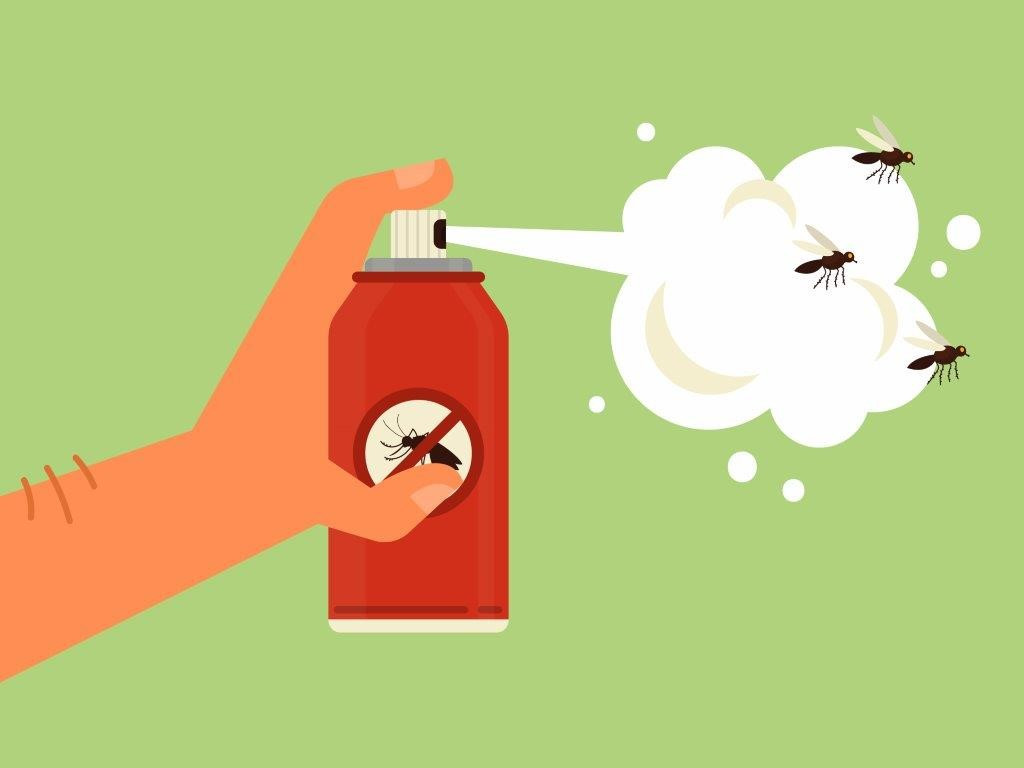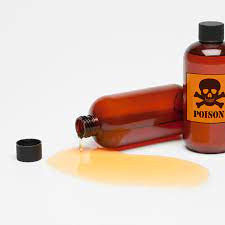Definition
Insecticide is a chemical used to kill bugs. Insecticide poisoning occurs when the chemical is swallowed, inhaled, or absorbed by the skin.
Most household bug sprays contain a chemical called pyrethrin. This chemical is initially isolated from chrysanthemum flowers and is not dangerous. However, this substance can cause breathing problems that can be deadly if inhaled in certain amounts by humans.
Strong insecticides used in commercial greenhouses contain dangerous substances like carbamates, organophosphates, or paradichlorobenzene (similar to camphor)
Causes
People most at risk of insecticide poisoning are those who live and work in husbandry, agriculture, or plantations. The poisoning typically occurs due to inhaling chemicals over an extended period. People living near these areas are also at risk of poisoning through consuming contaminated food or water. Other accidental routes include breathing and contact with the skin.
Instances of intentionally exposing oneself to insecticides by inhaling or swallowing them are usually in cases of suicide attempts. In such cases, the exposed chemical dosage is often lethal.
Risk factor
Insecticide poisoning can occur with exposure to the chemical in large doses or over an extended period. The risk is higher in:
- Rural or farming areas
- Household (bug medicine)
- Plantations
- Veterinarians
- Workers in agriculture, pest control, and other industries
Insecticides can also contaminate food due to their application on plants. However, with advancements in agricultural and food industry technology, the amount of chemicals in food is now regulated to prevent poisoning.
A 2021 study on the effects of organophosphate exposure in low-income countries, especially in Egypt, highlighted organophosphates as a common cause of poisoning globally due to their affordability and accessibility. The research involved 108 children under 16 years old receiving treatment for organophosphate poisoning in a hospital in 2019. The study found that 87% of cases were incidental, while 13% were suicide attempts.
In certain places, such as Nepal, there is concern about organophosphates being used as a means of suicide. Contributing factors include the lack of mental health support and the easy accessibility of organophosphates.
Symptoms
The symptoms of pyrethrin poisoning include:
- Breathing difficulty
- Skin irritation
- Redness or swelling
- Seizures
- Unresponsiveness, unconsciousness, to coma
The symptoms of organophosphate or carbamate poisoning are:
- Slowing of heart rate
- Breathing difficulty
- Wheezing or whistling sound while breathing
- Anxiety
- Vertigo
- Headache
- Seizures
- Weakness
- Increased urination
- Excessive saliva and tears
- Narrowing pupils
- Abdominal cramps
- Diarrhea
- Loss of appetite
- Nausea and vomiting
- Bluish lips and nails
- Unresponsiveness, unconsciousness, to coma
Serious poisoning can occur if organophosphates come into direct contact with the skin or if the skin is not promptly washed after exposure. Many chemicals can be absorbed through the skin unless proper protection is used. Deadly paralysis can occur rapidly.
The symptoms of paradichlorobenzene poisoning are:
- Diarrhea
- Abdominal pain
- Vomiting and nausea
- Muscle cramps or seizures
It's important to note that camphor containing paradichlorobenzene is not as toxic. This newer type of camphor is replacing the old type that was more poisonous.
Diagnosis
During the examination, the doctor will inquire about the history of insecticide exposure and specific symptoms. Organophosphate poisoning symptoms tend to manifest more rapidly than those of other insecticides. The initial physical examination involves measuring and monitoring vital signs such as temperature, pulse rate, breathing rate, and blood pressure. The doctor will also assess other specific signs of insecticide poisoning.
Additional examinations that may be conducted include:
- Blood and urine tests
- Bronchoscopy to examine the throat using a camera to identify wounds in the respiratory tract and lungs
- Chest imaging
- Electrocardiography
- Endoscopy to inspect the esophagus using a small camera to detect injuries in the esophagus and stomach
In cases where symptoms are severe, prompt treatment is initiated without waiting for laboratory exams. Diagnosis can be expedited by administering intravenous atropine to alleviate symptoms. Atropine serves as an antidote for insecticide poisoning.
Management
Home Treatment for Insecticide Poisoning:
If a member of your family experiences insecticide poisoning, follow these steps:
- Seek medical help immediately.
- Do not induce vomiting unless instructed by medical professionals.
- If the chemical comes into contact with the skin or eyes, wash with copious amounts of water for at least 15 minutes.
- If inhaled, move the person to an area with fresh air.
Before contacting emergency services, prepare information about:
- Patient's age
- Body weight
- Condition
- Insecticide product name, components, and strength if known
- Time of exposure
- Amount exposed
Upon reaching the emergency room:
Bring the insecticide container to the hospital if possible. Medical professionals will measure and maintain vital signs immediately upon meeting the patient. Vital signs measured include body temperature, pulse rate, respiratory rate, and blood pressure.
Treatment is based on the exposed area of the poison, including:
- Intravenous fluid intake
- Alleviating symptoms medication
- Gastric lavage using a tube to empty the stomach
- Skin irrigation or washing for several hours or days
- Surgery to treat burned skin
- Breathing apparatus, such as a tube connecting the mouth to the lungs connected to a ventilator
Complications
Insecticide exposure can lead to long-term complications, with severity depending on the amount and duration of exposure. Complications may affect various body systems, causing issues such as:
- Breathing
- Aspiration pneumonia (lung inflammation) due to excessive saliva
- Breathing failure from weakened respiratory muscles
- Severe bronchospasm (narrowing of the throat) causing breathing difficulties
- Accumulation of fluid in the lungs
- Heart or Blood Circulation:
- Irregular heart rhythm
- Increased or decreased heart rate
- High or low blood pressure
- Neurological system
- Changes in mental state
- Psychosis (hallucination or delusion)
- Seizures
- Neuropathy
- Weakness
- Memory problems
- Irritability
- Parkinsonism
- Digestive and Metabolism:
- Electrolyte imbalance
-
Insecticide exposure can lead to long-term complications, with severity depending on the amount and duration of exposure. Complications may affect various body systems, causing issues such as:
- Breathing
- Aspiration pneumonia (lung inflammation) due to excessive saliva
- Breathing failure from weakened respiratory muscles
- Severe bronchospasm (narrowing of the throat) causing breathing difficulties
- Accumulation of fluid in the lungs
- Heart or Blood Circulation:
- Irregular heart rhythm
- Increased or decreased heart rate
- High or low blood pressure
- Neurological system
- Changes in mental state
- Psychosis (hallucination or delusion)
- Seizures
- Neuropathy
- Weakness
- Memory problems
- Irritability
- Parkinsonism
- Digestive and Metabolism:
- Electrolyte imbalance
- Pancreatitis
- Elevated blood glucose levels
Additionally, insecticide poisoning can increase the risk of kidney problems and cancer.
Prevention
People at risk of insecticide exposure should take the following precautions:
- Wear Complete Protective Outfit: Use protective clothing when exposed to insecticides.
- Practice Good Hygiene: Wash thoroughly after handling insecticides and wash hands before eating or drinking.
- Know the Product: Be aware of the products containing insecticides to use them cautiously.
- Store the products in a secure location and label them clearly.
Other prevention measures include:
- Avoiding Insecticide-Containing Products: Choose alternatives that do not contain insecticides.
- Stay Indoors During Insecticide Spraying: Stay in a closed room with closed windows when insecticides are being sprayed.
- Check Water Sources: Ensure the safety of water sources if needed.
- Clean Fruits and Vegetables: Wash all fruits and vegetables thoroughly before consumption.
- Handle Insect Medicines with Care: Exercise caution when using insect medicines, as organophosphates may be clear to brownish liquids without a distinct smell, sometimes having a fruity odor.
Suicide Prevention
- Directly Ask: Ask the person if they want to hurt themselves or others.
- Listen Without Judgment: Provide a supportive and non-judgmental space for them to express their feelings.
- Call Emergency Services: Dial 112 or the local emergency number to connect with a counselor or mental health professional.
- Stay with Them: Remain with the person until professional help arrives.
- Secure Harmful Items: Safely secure any weapons, drugs, or objects that may pose harm.
These steps are crucial in offering immediate support and facilitating professional intervention to prevent harm.
When to see a doctor?
If you or someone has a history of insecticide exposure and is experiencing the symptoms listed above, take them to the emergency room immediately. Prompt treatment is crucial for positive outcomes and saving lives.
- dr Nadia Opmalina
-
Heller JL. (2019). Insecticide poisoning. Retrieved 28 Desember 2021, from https://medlineplus.gov/ency/article/002832.htm
-
O'Malley GF. (2020). Insecticide poisoning. Retrieved 28 Desember 2021, from https://www.msdmanuals.com/home/injuries-and-poisoning/poisoning/insecticid
-
Ciribo E. (2018). What you should know about organophosphate poisoning. Retrieved 28 Desember 2021, from https://www.healthline.com/health/organophosphate-poisoning
-
Fletcher J. (2021). What to know about organophosphate poisoning. Retrieved 28 Desember 2021, from https://www.medicalnewstoday.com/articles/320350












